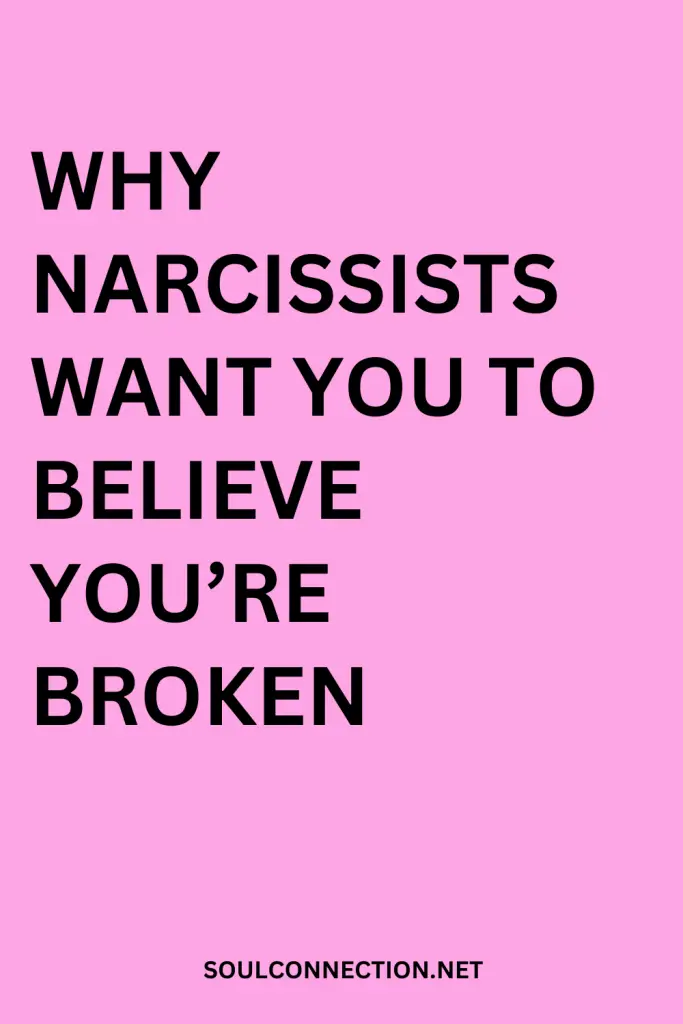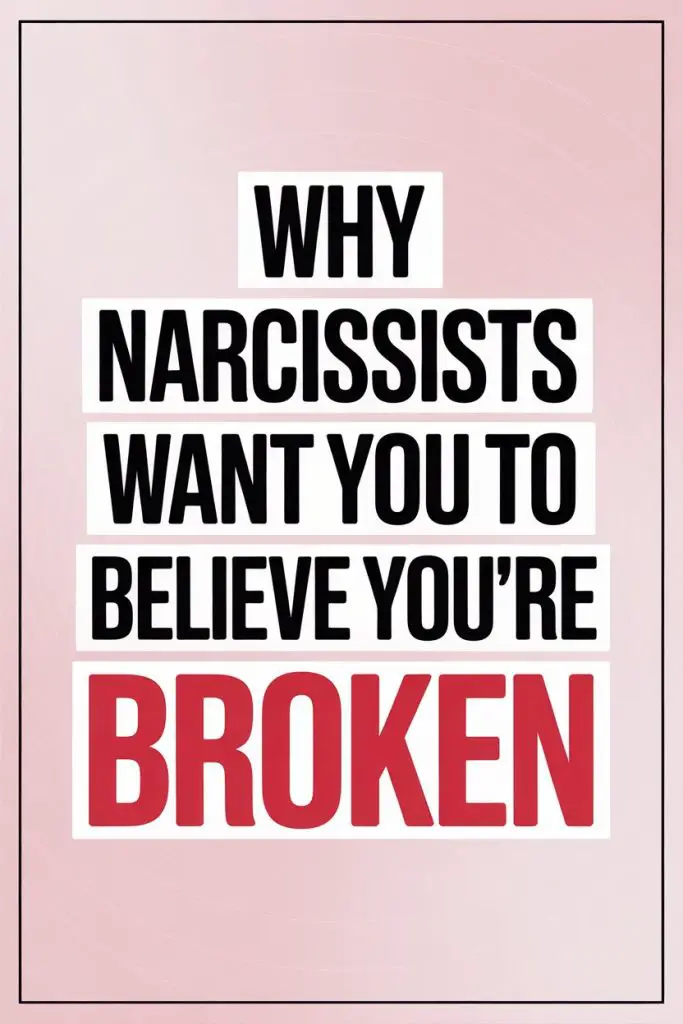Ever tried arguing with a narcissist and felt like you just lost a chess match you didn’t even know you were playing? That’s not an accident.
Narcissists have a knack for making you question your own reality—like some twisted version of emotional Jenga, stacking the blocks until you’re convinced your “flaws” caused the whole thing to tumble.
Understanding why narcissists push this narrative isn’t just a curiosity. It’s one of those rare relationship secrets that can save your sanity, confidence, and maybe even your friendships.
Let’s pull back the curtain on why narcissists are so invested in making you feel broken—and how you can protect your sense of self when their games begin.
The Power of Brokenness
Convincing another person they’re damaged is the narcissist’s secret sauce. If you think you’re the problem, you’re far less likely to question their behavior or challenge their control.
Suddenly, every argument becomes your fault, every issue your baggage. “You’re too sensitive,” they’ll say. Or “You always overreact,” as if your emotional thermostat is permanently set to ‘drama queen.’
This isn’t just garden-variety blame-shifting. Getting you to see yourself as fundamentally broken tilts the power dynamic. The narcissist gets to play the role of benevolent fixer—or long-suffering martyr—while you scramble to prove your worthiness.
Who’s in charge here? Spoiler: not you.
Control Is the Name of the Game
Feel off-balance lately? That’s intentional.
When you view yourself as defective, you’re much easier to manipulate. Your boundaries get fuzzy. You start second-guessing your needs, your feelings, even your memories.
Suddenly, you find yourself apologizing for things that weren’t your fault or bending over backwards just to keep the peace. That’s the sweet spot for a narcissist: a partner who’s so busy self-criticizing, they don’t notice the strings being pulled.
Gaslighting, silent treatments, those “jokes” laced with poison—these aren’t random. Each tactic chips away at your certainty and keeps you focused on fixing yourself, rather than expecting anything from them.
If you ever wondered why you feel smaller with every conversation, there’s your answer.
The Illusion of Superiority
Every narcissist’s favorite bedtime story? “I’m better than you.” But it’s hard to keep up that narrative if their partner is confident, self-assured, and living their best life.
Enter the “You’re broken” campaign: highlighting your insecurities, dredging up your past mistakes, and exaggerating your quirks until you’re convinced you’re the weirdest show in town.
This isn’t about accuracy. It’s about building a stage where the narcissist is always the star, and you’re just lucky to be in the audience. If you feel broken, they get to feel superior. And that, to them, is worth its weight in gold.
Ever noticed how the narcissist rarely compliments you without a catch? (“Sure, you’re smart, but you’re so naive sometimes.”) That backhanded praise isn’t a glitch; it’s the system working exactly as intended.
The Never-Ending Project
If the narcissist can keep you believing you need fixing, the relationship never has to grow. Every real problem, every roadblock, gets blamed on your supposed flaws.
Therapy is “for you.” Self-help books pile up on your nightstand. Friends politely ask if you’re okay.
Meanwhile, the narcissist gets to remain blameless—a misunderstood genius surrounded by people who just don’t get them.
Growth? Intimacy? Vulnerability? Not when they can spin their wheels forever in the muck of your “issues.”
This can be especially head-spinning in romantic relationships. The narcissist positions themselves as your savior, the only one who can put up with your baggage.
If you start healing or gaining confidence, don’t be surprised if their tolerance suddenly disappears.
Dependency: The Ultimate Goal
Ever felt like you’re stuck in a washing machine, just tumbling around, never quite getting clean? Narcissists love when you depend on them for validation, approval, even basic self-esteem.
If you see yourself as broken, you’re more likely to stick around and beg for their version of love—the kind that always comes with terms and conditions.
This dependency isn’t just emotional. Financial control, isolation from friends, and subtle sabotage of your goals all serve to deepen your reliance.
The narcissist becomes the center of your universe, and leaving feels as possible as swimming to New Zealand with a cinderblock tied to your ankle.
Breaking this cycle requires more than just willpower; it demands a total reset of your internal narrative. Spoiler alert: you’re not as broken as you think.
Gaslighting: The Mind-Bending Magic Trick
Gaslighting isn’t just a buzzword—it’s the narcissist’s bread and butter. Through constant denial, contradiction, and minimizing, they make you question your own reality.
Did that conversation really go that way? Was I too sensitive? Maybe I am the problem…
This self-doubt is the goal. If you’re always unsure, you’ll look to them for answers. You’ll trust their version of reality over your own instincts.
And what’s more appealing to a narcissist than someone who can’t trust themselves but trusts them implicitly?
If you find yourself rewriting history to make the narcissist look better, or second-guessing your own memories, congratulations: you’ve seen the magic trick. Now it’s time to step out of the illusion.
Self-Esteem on the Rocks
Everyone has insecurities, but narcissists have a sixth sense for sniffing them out. Those tender spots aren’t off-limits; they’re targets. By poking at your self-esteem, they keep you too busy managing your shame to notice their behavior.
Worried about your appearance? They’ll make “helpful” suggestions. Sensitive about your job? Expect backhanded compliments about your “potential.” The goal isn’t to help you grow; it’s to keep you small.
Confidence is kryptonite to narcissists. If you get too much of it, you might start asking for respect—or worse, equality. And we can’t have that, can we?
The Myth of the Difficult Partner
Somehow, every narcissist ends up with the world’s most “difficult” partner—at least, that’s what they’d have you believe. If they can convince you (and everyone else) that you’re hard to love, it justifies any mistreatment.
Outsiders are less likely to intervene, your friends might distance themselves, and you become more isolated.
This isn’t an accident. Painting you as broken helps the narcissist control the narrative, both inside and outside the relationship.
If you start doubting your own worth, it’s that much easier for them to keep you right where they want you.
If your social circle slowly evaporates, or you find yourself preemptively apologizing for your “issues,” take a step back. Whose story are you living, really?
Escaping the Broken Mirror
Spotting these patterns is half the battle—breaking free is the other. Here’s the good news: Your worth isn’t determined by someone else’s opinion, no matter how loudly or cleverly it’s delivered.
Rebuilding your self-image might mean leaning on friends, a therapist, or even just a journal that reminds you of who you really are. Boundaries are your new best mates—gently but firmly pushed into place, again and again, until they stick.
Notice when you start to internalize criticism and ask, “Is this truly about me, or about someone needing to feel superior?” Sometimes, that simple question is enough to break the spell.
And if you find yourself laughing at the absurdity—well, that’s a sign of healing, too.
You Were Never Broken
Here’s the big secret: You’re not broken. You never were.
Narcissists work overtime to convince you otherwise because it’s the only way they can keep you within reach.
The moment you see their tactics for what they are—a desperate attempt to control, not a diagnosis of your character—their power starts to slip.
Self-awareness is a slow, stubborn process, but it’s also the one thing narcissists can’t twist or take from you.
Start small: Trust your gut. Celebrate your quirks. Hold space for your feelings, even when someone else tries to tell you they’re wrong.
You’re not perfect (who is?), but you’re not broken either.
And anyone who tries to convince you otherwise? Well, that says a whole lot more about them than it does about you.


